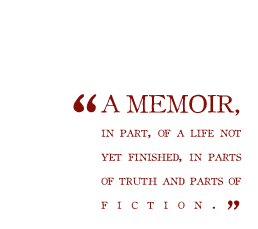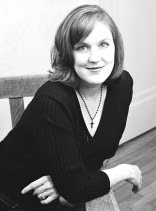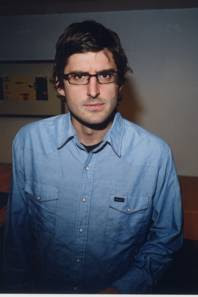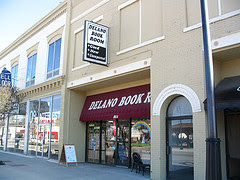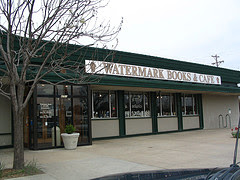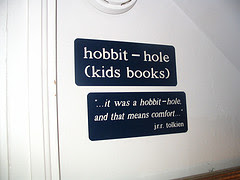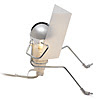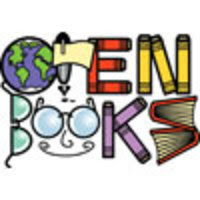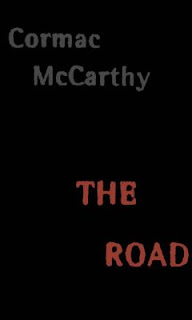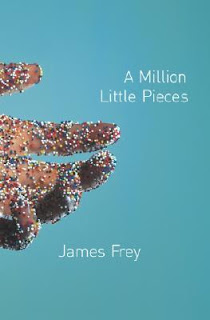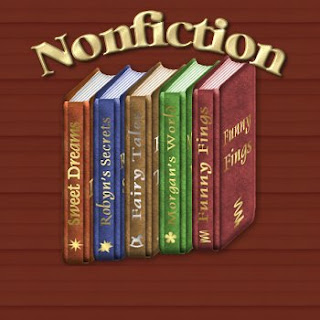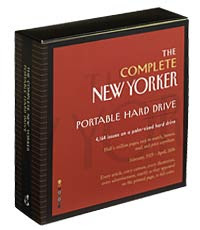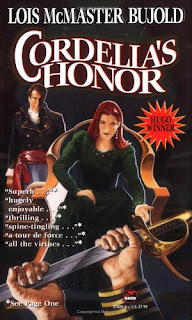Interviewed by
Melissa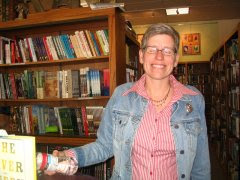
I recently sat down with Sarah Bagby, Managing Partner of
Watermark Books and Cafe in Wichita, Kansas to talk about the challenges of running an independent bookstore in Kansas, connecting to the community, and books in general.
MF: What's it like operating an independent bookstore in Wichita?SB: Watermark's celebrating our 30th anniversary this year. The business has changed a lot since we opened. Presently, it's a business that includes a cafe, so we're actually running two businesses, which keeps everybody on their toes constantly. We're always trying to integrate the food side with the book side. But they fit together so well, because both provide a sense of community and connection.
You ask what it's like running a bookstore. I'm active in the
industry, and because of our geography, and because most of the
publishing and decision making is in New York City, it requires
travel to make the connections necessary so that we can be included
in some of the national decisions that are made for author tours and
that sort of thing.
MF: People don't necessarily think of Wichita, Kansas when they're
planning a book tour?SB: Well, the east coast is far away. Not a lot of people have been
to Kansas. Technically, the midwest starts in Ohio, so when you say
you're from the midwest, they think it's close by. And really, we're
not. We're clear across the country. So, you have to at once be very
involved in both the publishing community and the local community.
Getting those two to come together in a way that works for both is
both a challenge and at the same time very exciting.
MF: Why?SB: Because you get to find out what's new. Because it's a business
that's relevant to people's lives. And while there's a tendency in
publishing and bookselling to go after the "next hot thing", there's
also a level of commitment to culture that is relevant. And I think
people are looking for relevance right now. When you look at how many
book clubs there are, and how people gather around writing, and
writers, and ideas, we fit into that really well.
MF: How did you end up at Watermark?SB: I was in college studying art history and I got a part time job
at Watermark. In my house growing up, books were more important than
furniture, so this was a comfortable place to be at a time in my life
when there weren't many comfort zones. And sort of by default I ended
up in the position of running it, and then I became a partner. Now
I'm sort of entrenched and I like it. The business and the challenges
have changed so much in the time that I've been here. I'm not running
the same business that I was running 20 years ago.
MF: What's the best part of working here?
SB: The feeling of creative possibilities. Connecting a book to a
reader. The possibilities are endless of what you can do there. The
staff that I work with is amazing and dedicated. And the product is,
well, first class. And even if you don't like one, you can still sell
it and sell one you love later.
MF: And the down side is?SB: You can never do everything you want to do. Because every season
there's the next new book to read, and you probably didn't get
through the stack from last year. It's the nature of the business.
We're just getting caught up with the spring list, and the fall one's
just coming out. At this point in the year, publishers are sending us
stuff that they want to know if it's any good that won't be out for
another year. The lag time that is kind of hard. We have a reading
journal (
http://www.watermarkbooks.com/reviews.html) on our web site where our staff can write about what we're reading, as we finish, which helps so much.
MF: How do you deal with the challenges of being an independent
bookstore in the age of box stores and Amazon.com?SB: Well, we get to choose our product. You can find the
blockbusters, and certain other types of books, at the box stores and
wholesale clubs at a price that we have to buy them for. So, we
intentionally look for the books that are not going to be in those
stores that are just as good, and that we can convince people to
read. That gives us the ability to create relationships with our
customers and develop a reputation that they rely on: that if they
only have so much time to read, they know that if it's from us, it's
really good. We also keep in close touch with local opportunities
that may not be available to the national chains because their
decision making process isn't here in town.
Additionally, the cafe and the bookstore working together is unique.
They cross over and that contributes to the profit margin. It's a
good mix. It just wouldn't have the same effect if we didn't have both.
MF: Can you give me an example of local opportunities? SB: We take local author's books without question. In those, are
always opportunities to resonate with the community, either just
because of the person's friends, or, for example, because it's a
history of the local area. There's always a connection there. We also
carry books for instructors for local colleges.
MF: You do a lot of community outreach -- book groups, story times, author events -- it can't just be good for business. Why do you feel it's important?SB: I think it helps the culture of the community. Because of our
connection to the national and local scenes, we can bring them
together in ways that no one else is doing. There are no real lecture
series in town that bring in big names. If we weren't doing it, I
don't know who would be. We're bringing in Anna Quindlen, and Kahled
Hosseini this year, both who are nationally-recognized writers. What
we do provides relevance, again. Books are things that people are
passionate about, and we give the citizens of Wichita a way to
participate.
MF: Are your book groups well attended?SB: Yeah. We had one that just started --Shakespeare Out Loud -- and
we had eight people. That was a good amount, because everyone's
reading out loud, everyone's participating. And for a first time idea
that's different, we felt it was successful. The groups range in
attendance, some have more than others. On average, there are at
least ten people for book clubs. We also have a monthly literary
feast that sells out. That's thirty people who, once they've bought
tickets and the book, have invested $50 in the event. I think the
book groups are well-attended because everyone can participate.
They're not so big that it becomes a lecture, and it gives us a way
to highlight books that we think are good to read. We sell many more
copies than people who come, so it's obviously reaching a broader
base than we could otherwise.
MF: Do you feel like your other efforts are well received?SB: Absolutely. We have good attendance for our events. We hear a lot
from speakers who come to Wichita that their best event was ours.
When I get quotes I got from authors, I sometimes think, "Are they
really talking about us?" They feel a connection to readers, they
feel like they came and talked to people who were interested and who
knew their work. The people who are coming to our events are readers,
and they love meeting the author and express that to them. If that is
all we've done, it's great.
I was recently interviewed for an article in Publishers Weekly -- they're doing a series on independent bookstores across the country (
http://www.publishersweekly.com/article/CA6433828.html )-- and my
quote was something like: you can predict what we like to read in Kansas but don't try to pigeon hole the market because you'll be surprised.
MF: Do you get that a lot? People trying to pigeon hole Kansas?SB: Before I started to develop personal relationships with the
publishing world in the past few years, I was just "Wichita". Now I'm
"Sarah", so they'll call me for advice and information. Now that I
understand what they're doing, they are more willing to understand
ours. I had to be concerned about their world so I could insert my
own in there. If I were to wait for them to come to me, it would have
never happened because of the distance. I don't begrudge anybody
that. But having the personal relationships have really helped the
quality of my business.
MF: Have you ever done something that was just a complete flop?SB: Oh, yeah. But we haven't had one in a long, long time, because
it's too painful for them and for us. And the publishers aren't
interested. So, we figured out how to make them work. We'll sometimes
have just a handful of people come, but it's not empty. We have
several people who are good friends that will come and help us if
they know, because they understand how hard it is.
MF: What's your favorite book?SB: I don't know that I have a favorite book.
MF: What's the best book you've read lately?SB: The best book I've read lately, probably was... Oh, I've been
reading so many good books. I love to read, and that's why I'm here.
The new
Kahled Hosseini was powerful, a very good book. I'm reading a book right now called
The Secret of Lost Things that is set in a bookstore in New York City. It's a great book for someone who works in a bookstore, and for those who love books. I read a first novel by AnitaAmirrezvani, an Iranian-American, called
The Blood of Flowers. It will be a great summer read. It's one of those books that I couldn't put down.
MF: What do you think the future holds for Watermark, and for
independent bookstores?SB: I think independent bookstores are tough. They are opening all
the time, though they're not opening big stores, say 10,000 square
feet. The Internet is a huge competitor. Probably bigger than other
stores, I think. So, we'll just continue to seek out a product that
will be relevant, and provide that to our customers and present it in
a way that's unique and personal and lasting. It's not like we're
getting rich here; it's a struggle, there are really low margins of
profit. But it's a business, and experience helps.
Melissa and Estella's Revenge wish Sarah Bagby and Watermark all the best.
